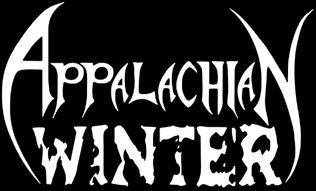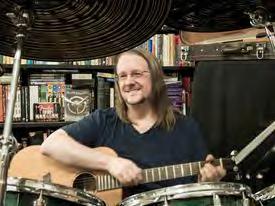9 minute read
Appalachian Winter. Interview with Daniel George Klyne
Next Article
Interview by Jay Parker

1) Tell us about Appalachian Winter? When and where was the band formed?
Sure thing. It’s a solo project, the name of which I came up with in March of 2008, I think. I was originally writing the music for the first album, Silence Before the Great Mountain Wind, under my real name (D.G. Klyne or something like that) but then felt I needed a better package for the material than simply my name. I’ve lived in the mountains of Pennsylvania my whole life, and the music is a response to our long and sometimes rough winters here. A small handful of friends contributed at times, but the project is now and for a majority of the time has been just me.

2) Explain your sound in 5 words.
Wild, symphonic, threatening, proud, imperfect. I’m a perfectionist, so that last one hurts. A lot.

3) Tell us about your albums / eps. are you recording new stuff at the moment?
As of now (10 October 2021) there are ten full albums, one EP, two singles, one split album, and one special collection. The collection is “special” because I took a bunch of my most recent tracks at the time (2014) and simply left out the guitars, bass, drums, and vocals and leaving only the orchestration. The two EPs are not original material – one being a cover of a track a friend wrote and another being a remake of a song from the Middle Ages. The split is with another one-person project (now inactive) called Draumar. All of them can be streamed and downloaded for free (please go to https://appalachianwinter.com for more on that). Many but not all can be streamed on a bunch of streaming services as well, including Spotify. Some are available physically, though at the time of this interview, the label the represents me, Nine Gates Records, has temporarily closed its doors while its owner gets some personal things taken care of. We expect to be selling records again in November of 2021. As of now, the first four albums, the EP, the two singles, and the collection are not offered physically. The split is offered as a 12” vinyl record. The more recent six albums offered are in CD form. I am getting ready for album eleven, which I expect to start before this year is out. I already have the song list (titles) and countless musical ideas for this effort. I’m looking forward to the one, especially since the last two albums were a bit more personal and a bit dark for my taste, even as far as Appalachian Winter is concerned. I look forward to focusing on the concepts of winter and the mountains again as more their own thing rather than a reflection of something else going on within me. I can say that the new album is going to be called Wintermountains Rise, although I’m doubting the sound is going to be a proper follow-up to the last two albums. That said, the music should still have Appalachian Winter’s signature sound to it.
4) Your sound really takes the listener on a long stroll through cold forests and mountains... you really captured the landscape in your music, it’s fantastic. Tell us about that sound... what instruments do you use? Do you use any different guitar tunings? What equipment do you use?
Well, first off I really appreciate the compliment! First things first – piano and keyboards. My orchestration comes from a combination of native sounds from a Yahama PSR 1500, and Korg M50, a Yamaha YDP 223 electric piano, and MIDI banks that come with Cakewalk’s DAW. Up until the album I’m starting work on now, my drums came from that same Yamaha keyboard. What’s exciting (and terrifying) is that the drums are going to be an actual set from here on out, and they won’t be sample replaced. I have a humbucker Telecaster and a couple Les Pauls (Epiphone, PRS) that I use for the guitars. My main amp sound comes from a miced JSX half-stack, often hybrid with some kind of amp modeling to fill out the sound. The bass is a five-string fretless ESP Ltd through an older model SansAmp. Vocals are courtesy of my untrained and often uncooperative throat. That is the vast majority of the sound, and those guitars are standard tuning. You’ll also hear at least three acoustic guitars from time to time (and I usually use these all at the same time) – one is a Martin in standard, a Washburn high-strung, and a ¾ size Taylor in A standard.
I’ll also use a Godin nylon-strung guitar (standard tuning) mostly on its own. Less often, you’ll hear a banjo, hammered dulcimer, mountain dulcimer and even a harp. Mandolin family instruments, including bouzoukia, also make an occasional appearance. I’ve even used a jaw harp on at least one track a long time ago.
5) Tell us about your musical influences when you were growing up.
Well, when I was a kid, I was listening to the same stuff my parents were listening to. That was either Classical music or the popular music Boomers like. That’s not a slam against any of that music. I love it to this day. My favorites of those two were Tchaikovsky and Frankie Valli and the Four Seasons. I was born late in the year 1980, and much of the music going around in the ‘80s as a whole feels eternal and awesome to me; the metal, the pop, New Wave – those things, and I love that stuff, too – all of it. Even “Hey Mickey.” When the ‘90s hit, I was like every other teenager at the time who enjoyed Nirvana, Pearl Jam, R.E.M., and especially Live in my case. Despite Live being my favorite, I remember driving through the mountains listening to R.E.M.’s Out of Time album and being stuck by how well that music seemed to go with the mountains, and I think that experience wired me to start associating music with place. But, it was in the middle part of that decade when I got my hands on Metallica’s self-titled album. I could not stop listening to it. That tape was in my Walkman for weeks. Some years later, I picked up Dimmu Borgir’s Puritanical Euphoric Misanthropia, and that’s when I knew I had been a metal head since hearing the Black Album. That was another album I could not stop listening to. I couldn‘t believe something so heavy was also orchestrated. By this time, I had been a musician for a few years, and I knew that sound was something I wanted. There’s so much more to the story afterwards, but it really gets complicated – finding out the roots of Second Wave black metal with both the music and events in Scandinavia in the ‘90s that I had no idea about, exploring folk metal after finding out about Falkenbach, and again not being able to listen to anything besides Ok Nefna Tysvar Ty for a long time.
6) What bands do you listen to today? Do you like the new black metal generation?
It’s mostly the same as when I first found black metal and folk metal – Borknagar, Dimmu Borgir, Ulver (all eras, they can’t do wrong by me), Emperor, Wintersun, Ensiferum, Moonsorrow, Falkenbach, Einherjer, Tyr, Die Saat, and Elffor to name a few. It’s not limited to those kinds of bands, though. I love Hammerfall, Nightwish, Alestorm, Devin Townsend, Edguy, Sabaton, Epica – those kinds of musicians as well. There are all kinds of newer bands/projects that are doing incredible things. My favorite right now is a project called Havukruunu. There are so many others, like Draugnim, Bal-Sagoth, and greyfleshtethered. I don’t follow music like I used to, mostly for the twofold reasons of Appalachian Winter taking a tremendous amount of my energy, and the fact that I’ve known for a long time now what I’m meant to do musically, so I just do not consume like I used to. Yet another part is I’m old now, and I can’t keep up. I’m 41 years of age! Like a proverbial old fuck, I’m also assuming that by “new black metal generation,” you refer to anything post second wave, so my apologies should I be incorrect.

7) What is your opinion on the future of Black Metal? Where do you see it in 10-15 years?
It’s difficult for me to say, but I’m optimistic. Music that’s this far underground I don’t think can ever really go stale (unlike, unfortunately, individual projects may – something I keep in mind as I consider how long I’ve been doing Appalachian Winter), so I have a hunch that the music styles can stay fresh. Black metal likely will continue to evolve, split into subgenres of its own and do the things that musical movements do. You’ll have purists who will want their music to pay homage to ‘90s Norway, and you’ll have other folks who will try to push the genre into something else. They won’t all succeed, but man, the ones who do are going to be incredible. I can’t wait to hear what’s coming!
8) Do you have anything you’d like to add for our readers?
These were some damn good questions. They made me think about this stuff in ways I’ve never bothered to do so before. I kind of just do what I do without considering why or what motivates me. Looking back, especially at the question about my influences, I now see why Appalachian Winter works for me the way it has. I hope I can keep going with it for a long time yet. I apologize for my wordiness, and I appreciate your time! Thanks, Jay!
Massive thanks Danny, love the music, keep at it man! Make these mountains sing!!! Jay


